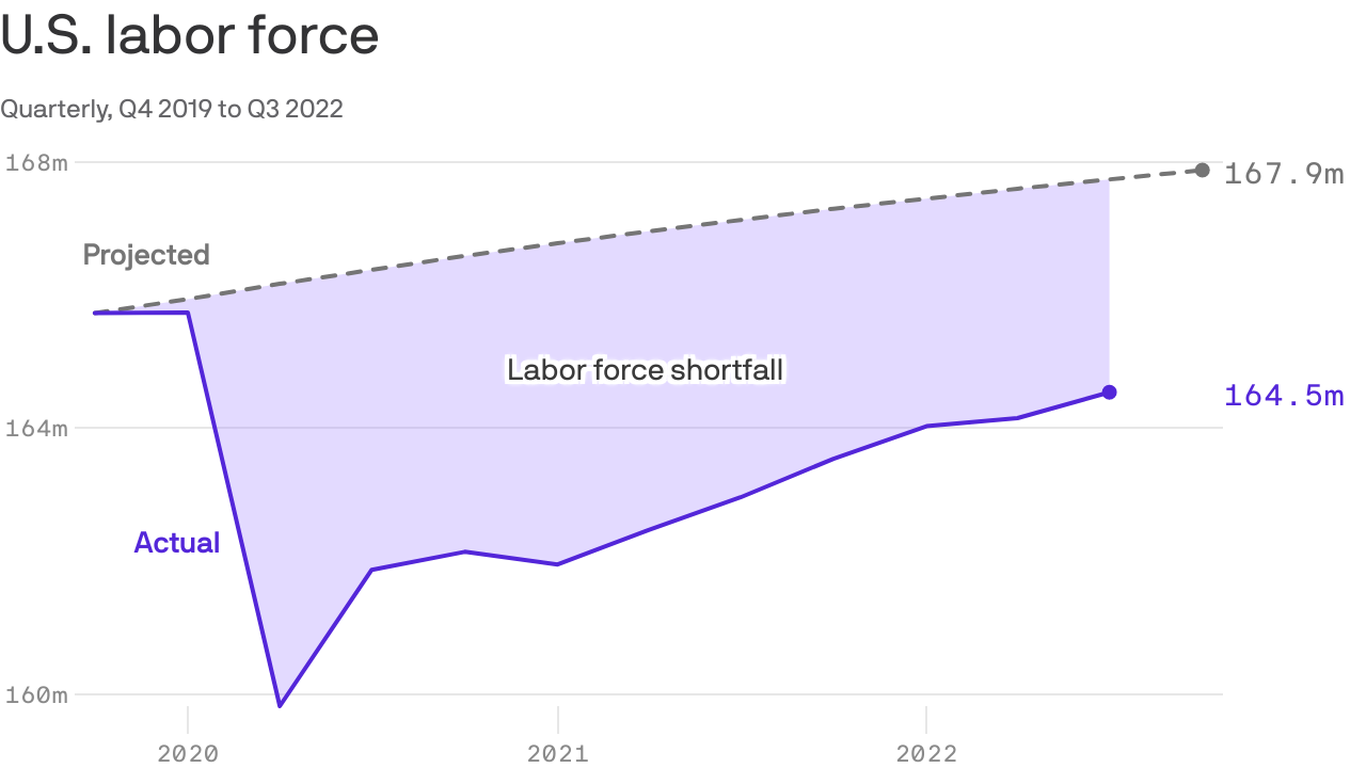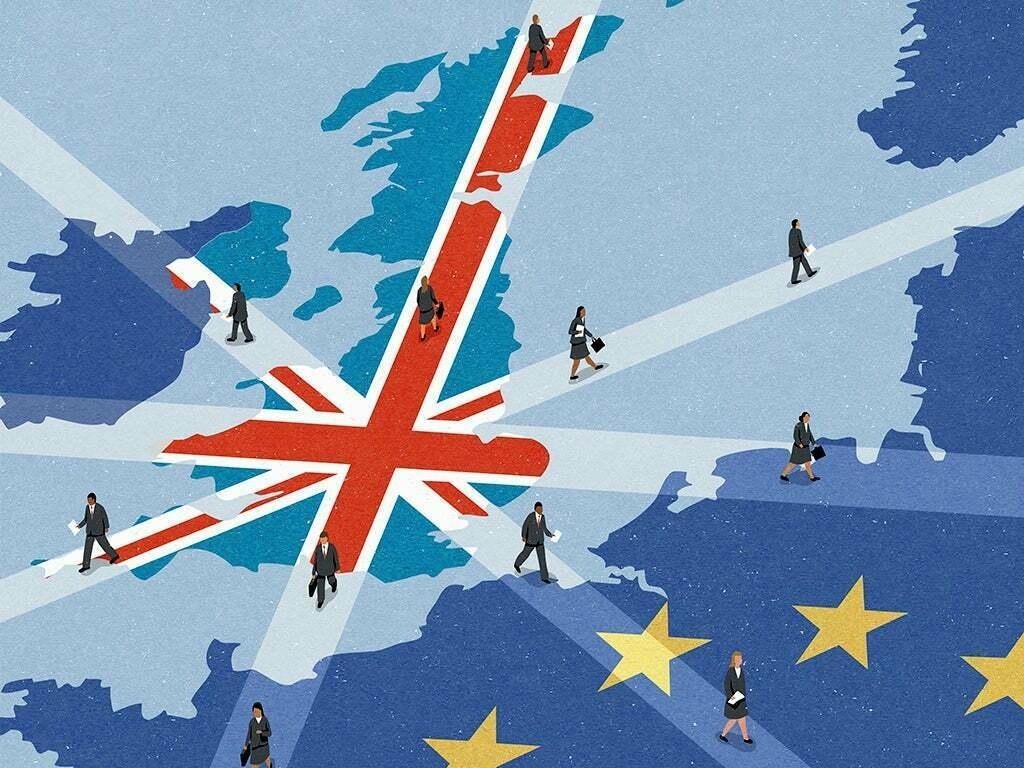On the economic pressures of Covid
This is data from the USA, but the picture I should imagine might be true on a smaller scale in the UK. The difference, I guess, not being an economist, is that we still have a larger state over here and some vestiges of union action.
So how this plays out in terms of the pressure it puts on the workforce, and especially those employed directly or indirectly by the government, is different. It's why we're having lots of strikes right now.
It strikes me as extremely disingenuous of the UK government to be spinning the current crisis as being about them trying to avoid 'embedding 10% inflation' in the economy. It's not like we're going to see a reduction in prices if inflation levels decrease. People will still have had a real-terms pay cut.
As an historian by training, I can't help but think about the parallels with the Black Death and the collapse of feudalism due to the lack of workers...

Federal Reserve chair Jerome Powell struck a particularly somber note at his press conference earlier this week when he mentioned that one reason the labor market is so tight right now is that many workers died from COVID-19.
The big picture: Economists have theorized for a while about the impact of COVID deaths on the labor market. Now, research has started to emerge and key public figures like Powell are starting to talk about it explicitly.
Source: Fed chair Powell on the U.S. labor shortage: COVID, retirements, missing immigrants | Axios
No benefits to post-Brexit deregulation
Coupled with the pandemic and the energy crisis, Brexit is absolutely destroying the UK at the moment. If you haven’t watched The Brexit Effect made by the Financial Times, then you really, really should.
This article in the New Statesman argues that the deregulation touted as a huge benefit of Brexit isn’t wanted or needed by most UK businesses. It’s the red tape added by being outside the EU single market that’s the problem.
Most businesses have no interest or understanding of the government’s plans for post-Brexit deregulation. And a majority of companies could not name a single EU law that they would change or remove to become more profitable, according to findings shared exclusively with the New Statesman by the British Chambers of Commerce.Source: Exclusive: Most UK businesses see no benefit in post-Brexit deregulation | New Statesman[…]
In a new survey of 938 businesses, made up largely of SMEs (and therefore representative of the UK economy), just 14 per cent specified an EU regulation they would remove; 58 per cent of firms had no preference over the amendment or removal of any EU regulation. Half said that deregulation is either a low priority or not a priority at all.
The UK is in crisis
I’m writing this outside a coffee shop in Tynemouth. The place is absolutely heaving on a sunny summer’s day, but it’s takeaway only as they can’t get enough staff. Elsewhere, everywhere from postal workers to bin men to lawyers are on strike.
An editorial in Le Monde comments on the “worst crisis since the 1970” in the UK:
Charlie Stross goes further:The pre-eminence of ideology over pragmatism – a supposedly British virtue – has already led to the Brexit disaster, and risks prolonging and even worsening the deteriorating situation left by Mr. Johnson, whose lies have widened the divorce between public opinion and politics. An economic crisis and instability could feed the temptation to resort to anti-European and nationalist rhetoric. At a time when threats are mounting across Europe, highlighting the need for strengthened solidarity, the crisis in the United Kingdom is a warning to all its neighbors.
Politics is dominated by an incumbent party who have ruled, except for a 13 year period (during which they were replaced by the Tory-Lite regime of Tony Blair), since 1979—43 years of conservative policies. They're completely out of new ideas, but the next leader of the nation is intent on recycling the same tired nostrums indefinitely, using an astroturfed culture war on wokery as cover rather than trying to address the deep structural problems of a state that has been hollowed out and looted for half a lifetime, so that there is no resilience left in our institutions.Sources: The UK's downturn is a warning for Europe | Le Monde, and The gathering crisis | Charlie's DiaryThis is the sort of crisis that brings down nations.
Image: DALL-E 2
The UK is in crisis
I’m writing this outside a coffee shop in Tynemouth. The place is absolutely heaving on a sunny summer’s day, but it’s takeaway only as they can’t get enough staff. Elsewhere, everywhere from postal workers to bin men to lawyers are on strike.
An editorial in Le Monde comments on the “worst crisis since the 1970” in the UK:
Charlie Stross goes further:The pre-eminence of ideology over pragmatism – a supposedly British virtue – has already led to the Brexit disaster, and risks prolonging and even worsening the deteriorating situation left by Mr. Johnson, whose lies have widened the divorce between public opinion and politics. An economic crisis and instability could feed the temptation to resort to anti-European and nationalist rhetoric. At a time when threats are mounting across Europe, highlighting the need for strengthened solidarity, the crisis in the United Kingdom is a warning to all its neighbors.
Politics is dominated by an incumbent party who have ruled, except for a 13 year period (during which they were replaced by the Tory-Lite regime of Tony Blair), since 1979—43 years of conservative policies. They're completely out of new ideas, but the next leader of the nation is intent on recycling the same tired nostrums indefinitely, using an astroturfed culture war on wokery as cover rather than trying to address the deep structural problems of a state that has been hollowed out and looted for half a lifetime, so that there is no resilience left in our institutions.Sources: The UK's downturn is a warning for Europe | Le Monde, and The gathering crisis | Charlie's DiaryThis is the sort of crisis that brings down nations.
Image: DALL-E 2
The Cult of the Upper Classes
Today is the day that the IPCC report is released. Our response to it, in the UK at least, depends a great deal on the attitude that the upper classes have towards it. That shouldn’t be the case.
Far too many people in this country remain wedded to the cult of the upper class – a cult that should long ago have withered to a death, but which is instead enabled by the media, by stealth, and by a fawning faith in aristocracy that still prevails. Its bastard by-product, nepotism, remains rife – elevating those of little talent, charm or ability to some of the top gigs in the land.Source: England’s Upper Classes: A Dangerous Cult – Byline Times
The Cult of the Upper Classes
Today is the day that the IPCC report is released. Our response to it, in the UK at least, depends a great deal on the attitude that the upper classes have towards it. That shouldn’t be the case.
Far too many people in this country remain wedded to the cult of the upper class – a cult that should long ago have withered to a death, but which is instead enabled by the media, by stealth, and by a fawning faith in aristocracy that still prevails. Its bastard by-product, nepotism, remains rife – elevating those of little talent, charm or ability to some of the top gigs in the land.Source: England’s Upper Classes: A Dangerous Cult – Byline Times
To be in process of change is not an evil, any more than to be the product of change is a good

🌐 Unlimited Information Is Transforming Society
📱 Your Smartphone Can Tell If You’re Drunk-Walking
🚸 Britain's obsession with school uniform reinforces social divisions
🤖 Robot Teachers, Racist Algorithms, and Disaster Pedagogy
Quotation-as-title by Marcus Aurelius. Image from top linked post.



